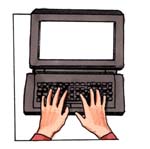 When my readers commented about how much they enjoyed my blogs, I decided to combine the best of my nonfiction—including all the posts I wrote about my journey to become a full-time novelist—into a book. I thought my readers would like to know more about me, and authors would find the writing, editing, and promotion advice helpful and inspiring. Read more →
When my readers commented about how much they enjoyed my blogs, I decided to combine the best of my nonfiction—including all the posts I wrote about my journey to become a full-time novelist—into a book. I thought my readers would like to know more about me, and authors would find the writing, editing, and promotion advice helpful and inspiring. Read more →
 I edit a lot of fiction, and I see a pattern of common problems in manuscripts from novice writers. The most important involve the bond between story and character. If you want an agent or editor to get past the first page, here’s 10 things to keep in mind.
I edit a lot of fiction, and I see a pattern of common problems in manuscripts from novice writers. The most important involve the bond between story and character. If you want an agent or editor to get past the first page, here’s 10 things to keep in mind.
1. Make your main character want something. Read more →
The book Fascinate: Your 7 Triggers to Persuasion and Captivation has caught my attention. It may have been written as an analysis of marketing techniques that build brands, but as a crime fiction author, I’m taking note. I want my novels to fascinate readers, so I’m keeping this list on hand as I craft my next story. Here are the seven triggers that draw people in:
- Lust: the anticipation of pleasure, which we crave Read more →
 Tip of the Week: Be ready for an encounter with the media. I read this tip recently and decided to act on it. So I made up some disks that include:
Tip of the Week: Be ready for an encounter with the media. I read this tip recently and decided to act on it. So I made up some disks that include:
- bio
- head shot jpg
- book cover jpgs Read more →
 My editor is tired of my use of the words moved and stepped, so she sent a list of alternatives and I keep adding to it. I keep this list handy when I’m working on a novel, and my writing tip today is to share this lovely list with you.
My editor is tired of my use of the words moved and stepped, so she sent a list of alternatives and I keep adding to it. I keep this list handy when I’m working on a novel, and my writing tip today is to share this lovely list with you.
strode, walked, lurched, ran, scurried, bustled, rushed, Read more →
Is the focus of the novel revealed early? This question is at the top of contract evaluations I do for a publisher. Most of the time, I check No. Writers often move slowly in the beginning. They set up backstory and craft detailed irrelevant scenes. Two chapters later, I still don’t know what the premise is. The best stories jump right in and reveal what the character wants and/or what the character is up against to get what he wants.
Revealing the focus can be indirect. Read more →
I’m still working through the rewrite on my forth novel and finding self-editing tips to share.
1. Get rid of the word that. In my last post, I wrote a sentence like this: If a guy in a driveway points at tires, readers will assume that you mean on the car. I went back and took out that. The sentence reads better without it. Sometimes the word will be needed for clarity but not often. Read more →
I’m fine-tuning the novel I just finished, and these are some of the edits I’m making. They can help you as you write or edit your own novel.
1. Get rid of unnecessary prepositional phrases. When you read back through your manuscript, watch for phrases like on the table, toward the door, near the wall. These phrases bog down your writing and often add little to a description. Readers can make a lot of assumptions. If two guys are standing in the driveway talking and one points at the tires, readers Read more →
Last night a tall man with a British accent joined our group at the bar while I was in the rest room. When I got back, I said, “I didn’t catch your name.” He shook my hand and said, “Lee Child.” I was surprised, delighted, and embarrassed that I didn’t recognize him. He gave us this great advice: “The most important thing you can do as a writer is to focus on the quality of the second book.” Read more →
I read a blog post recently that claimed having a day job is good for your writing career and it made me wonder. She supported the claim with several points, the first being that having a steady income is a good thing. No argument there. If your novels are not paying the mortgage, something has to. But putting aside the money/necessity issue, I’m not sure most day jobs are good for a fiction writing career. In fact, I’d bet most novelists would give up their day jobs in a heartbeat if they didn’t need the money. (The exception being doctors and lawyers.)
The blogger’s second point—that it “gives you the urgency to write when you do have time”— may be true if you’re a receptionist in a chiropractor’s office who spends most of the day reading magazines. But if your day job is, say, editorial project coordinator for an educational publisher, and you spend your day writing copy, editing galleys, generating ideas, tracking documents, planning and attending meetings, etc., then it’s very likely your brain power will be spent by the end of the day and no matter how much you want to work on your novel after dinner, it probably won’t happen. Or you’ll try and get very little done. On the other hand, a job that leaves you physically exhausted but requires no real brain energy (pulling green chain) might allow you to be more creatively productive in your free time. Having done both jobs, I speak from experience. (The chiropractor receptionist job I just made up. )
Another supporting point was that it “provides material for your writing.” Again, it depends on the job. The green chain job offers little in the way of stimulus for characters or scenarios, but it will give you that “urgency” to write. That sense of “I must finish this novel and get it published so I can quit this hellish job before I go insane.” Then of course, some writers get whole novels out of their day jobs (The Devil Wears Prada). Most jobs fall some where in the middle of the continuum as far being a source.
My own situation is that I work three days a week for a newspaper, which provides a steady paycheck. But on those days, after writing copy all day, I don’t write novels when I get home. I also do freelance editing and manuscript evaluations. But I do those projects on nights and weekends after I work on my novel. So most days, my personal writing gets the biggest surge of my creative juices. And this is why I’ve been able to write two novels in the last fourteen months. Not because I have more free time, but because I have more focus.
What do you think? Is your day job good for your writing career? Would you give it up if money wasn’t an issue?
